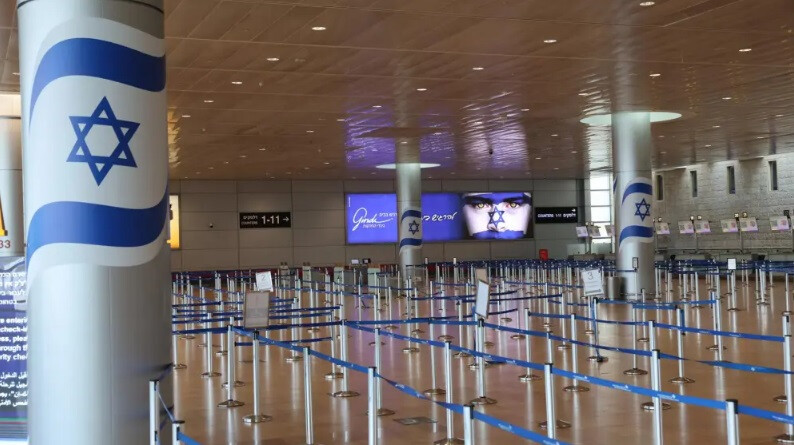
As hostilities between Israel and Iran escalate, Israel's airspace has been closed, leading to an unprecedented situation where approximately 40,000 foreign tourists are stranded in Israel. The Israeli Ministry of Tourism announced this situation on Monday, June 16, activating an emergency system to assist tourists. Tel Aviv's Ben Gurion Airport has effectively come to a standstill, and stranded tourists are attempting to escape to neighboring countries by land, intensifying the chaos.
Airspace Closure and the Tourists' Desperate Situation
The Israeli Ministry of Tourism has officially confirmed that tens of thousands of tourists have found themselves in an unexpected predicament due to the airspace closure. The departure terminal at Ben Gurion Airport was empty, and tourists' return journeys are virtually blocked due to flight cancellations and delays. To assist tourists in this situation, the Ministry has opened a virtual office via email (virtual@goisrael.gov.il) and phone (+972-53-583-5808), and is also providing information through its Facebook page, 'Israel Virtual Tourist Office'. Israeli Minister of Tourism, Haim Katz, stated that they are working closely with domestic hotels and accommodation facilities to provide necessary support to tourists facing difficulties.
However, many tourists are seeking to escape by land rather than waiting for flights to resume. Israeli airport authorities reconfirmed yesterday that land border crossings remain open. Consequently, a significant number of stranded tourists are planning to travel by land to neighboring countries like Jordan or Egypt and then find flights home from there.
Three German tourists stranded in Jerusalem told EFE that they had received no help from their embassy and that crossing into Jordan to take a flight from there was their top priority. This demonstrates a reality where diplomatic missions are either not functioning properly or the situation is too urgent for individual support. Earlier reports indicated that Paraguayans staying in Israel also testified to "confusing moments" after taking shelter in a bunker following air raid sirens.
Ramifications of Escalating Israel-Iran Conflict
This mass stranding of tourists occurred as the conflict between Israel and Iran intensified. In the early hours of last Friday, Israel launched military operations against Iran, attacking military, energy, and nuclear infrastructure, as well as several residential areas in Tehran. In response, Iran fired hundreds of ballistic missiles towards Israel, some of which hit various areas within Israel, resulting in at least 24 deaths, according to Israeli authorities.
According to Iranian health authorities, at least 224 people have died in Iran, most of whom are identified as civilians. Among the deceased are 17 high-ranking military officials (including 9 Revolutionary Guard members) and over 10 nuclear scientists, suggesting that the clash between the two countries is not merely retaliatory but is leading to severe casualties and loss of key personnel.
Israeli airport authorities stated yesterday that they would give at least 6 hours' prior notice before reopening their airspace and are working with their domestic airlines to formulate a plan to repatriate Israeli citizens stranded abroad. However, the Israeli military warned that many "targets" remain, and the Iranian Revolutionary Guard asserted on Monday that they would continue missile attacks until Israel's "destruction." These hardline stances from both sides suggest that the conflict is unlikely to be resolved in the short term, raising concerns that the situation of stranded tourists could be prolonged.
International Concern and Economic Ripple Effects
A full-scale military conflict between Israel and Iran threatens the stability of the entire Middle East, and the international community has expressed deep concern. The UN and other international organizations are urging immediate resolution and prevention of escalation, but a diplomatic solution seems distant due to the unyielding stance of both parties.
This incident is expected to inflict a massive blow on Israel's tourism industry, beyond mere inconvenience for tourists. Tourism is a vital part of the Israeli economy, and this uncertainty could lead to a decline in investment and economic stagnation. Furthermore, airspace closures and flight cancellations can impact logistics and trade, adding additional pressure to global supply chains.
Rising tensions in the Middle East are also directly affecting international oil prices. If instability persists in a region dense with major oil-producing countries, it could lead to surging oil prices, negatively impacting the global economy. This could fuel inflation and dampen economic recovery efforts worldwide.
This Israel-Iran conflict extends beyond a mere regional dispute, causing ripple effects across various aspects of the international community, including security, economy, and diplomacy. The 40,000 stranded tourists are a snapshot of this complex international situation, and their discomfort and anxiety symbolically reflect the reality of the world we face.
[Copyright (c) Global Economic Times. All Rights Reserved.]




























